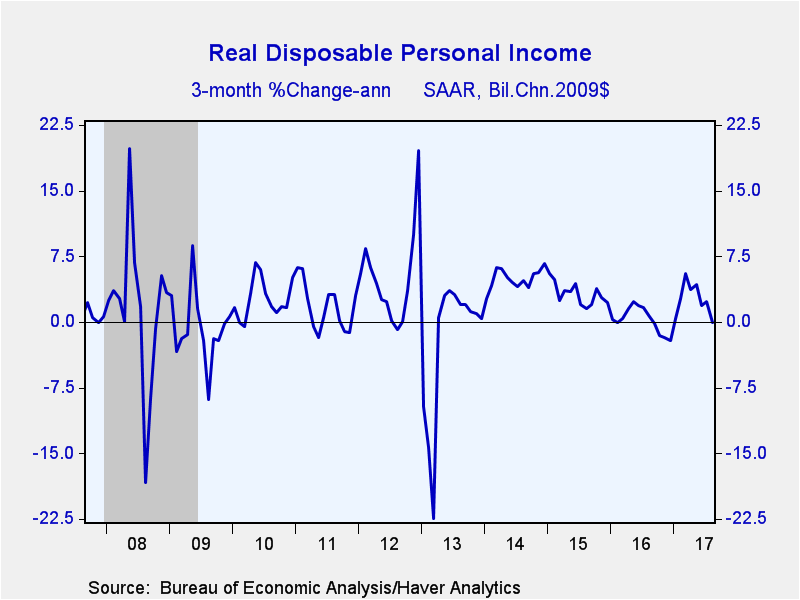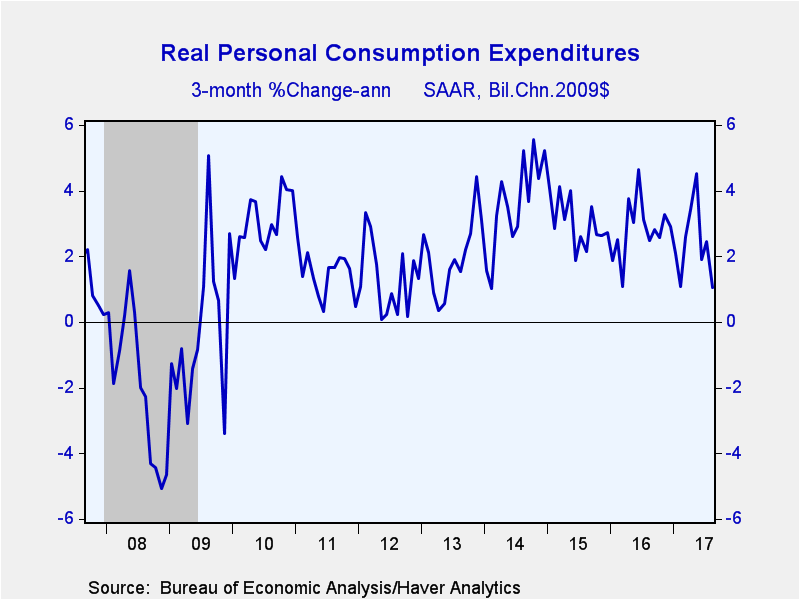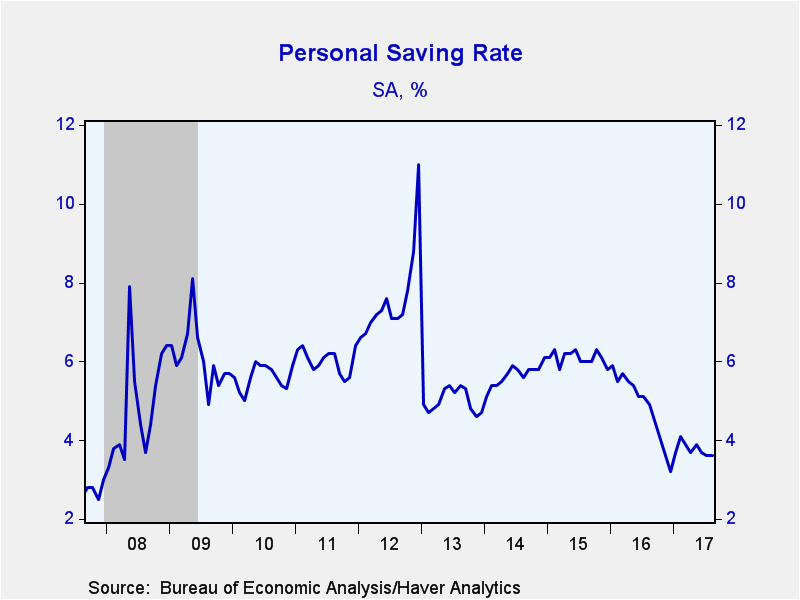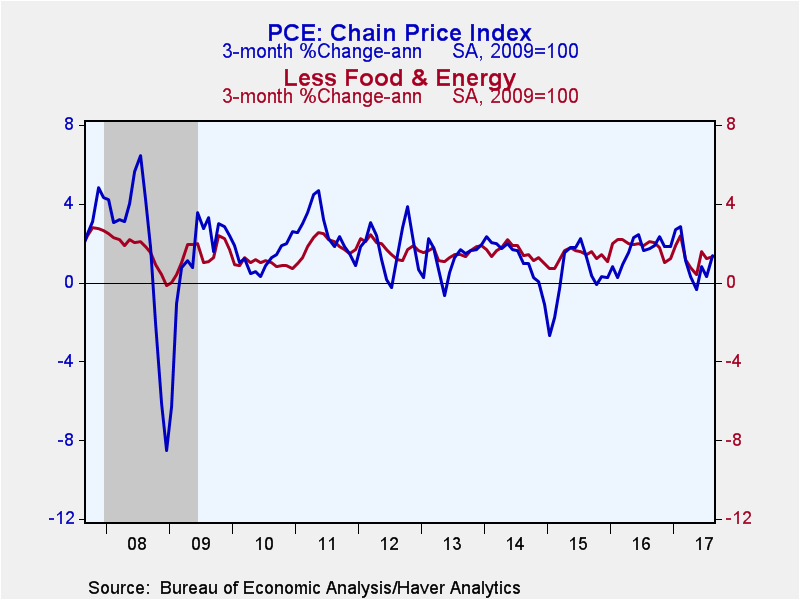 Global| Sep 29 2017
Global| Sep 29 2017U.S. Personal Income & Consumer Spending Growth Ease
by:Tom Moeller
|in:Economy in Brief
Summary
Personal income increased 0.2% during August (2.8% y/y) following a 0.3% July rise, revised from 0.4%. The latest gain matched expectations in the Action Economics Forecast Survey. Wages & salaries remained unchanged (2.7% y/y) [...]
Personal income increased 0.2% during August (2.8% y/y) following a 0.3% July rise, revised from 0.4%. The latest gain matched expectations in the Action Economics Forecast Survey. Wages & salaries remained unchanged (2.7% y/y) following two months of strong gains. Rental income grew 0.7% (6.5% y/y) after two months of 0.6% increase. Proprietors' income advanced 0.3% (2.9% y/y) following declines in three of the prior four months. Personal interest income improved 0.2% (2.8% y/y) for a second straight month. That followed three consecutive months of 0.9% decline. Dividend income also rose 0.2% (1.5% y/y) after a 0.5% increase. Personal transfer receipts improved 0.3% (2.7% y/y) after two months of 0.2% increase. Social Security payments ticked 0.1% higher (3.3% y/y) and Medicare payments gained an improved 0.3% (2.8% y/y). Unemployment insurance benefits declined 1.0% (-11.2% y/y).
Disposable income inched up 0.1% (2.7% y/y) following a 0.2% rise during July. Adjusted for price changes, take-home pay slipped 0.1% (+1.2% y/y) and reversed July's increase.
Personal consumption expenditures ticked 0.1% higher last month following an unrevised 0.3% rise. A 0.1% gain had been expected. Adjusted for price change, personal spending eased 0.1% (+2.5% y/y), the first decline since January. Real durable goods purchases declined 1.0% (+5.8% y/y), pulled lower by a 2.7% drop (+2.4% y/y) in motor vehicle buying. Real furniture purchases eased 0.2% (+6.3% y/y), but real spending on recreational goods & vehicles rose 0.1% (9.0% y/y). Constant dollar spending on nondurable items fell 0.2% (+1.7% y/y), off for the third straight month. Real purchases of clothing & footwear declined 0.8% (+1.0% y/y). Real spending on gasoline & oil declined 0.9% (-0.9% y/y), down for the fourth month in the last five. Real spending on food & beverages rose 0.3% (1.4% y/y). Real spending on services improved 0.1% (2.2% y/y) for the third straight month. Real outlays on health care rose 0.2% (2.8% y/y) but housing & utilities expenditures eased 0.1% (+0.3% y/y), the sixth monthly decline this year. Real recreation spending held steady for the second straight month (3.2% y/y).
The personal savings rate held at 3.6%, but remained down from the 6.1% high during all of 2015. Personal saving declined by roughly one quarter y/y.
The chain-type price index increased 0.2% (1.4% y/y), the strongest increase since April. Excluding food & energy, prices increased 0.1% (1.3% y/y) for the fourth straight month. Durable goods prices eased 0.1% (-2.2% y/y), down for the seventh straight month. The price index for recreational goods & vehicles fell 0.7% (-3.8% y/y). Nondurable goods prices rose 0.5% (1.3% y/y) as gasoline prices jumped 5.8% (9.9% y/y). Services prices improved 0.2% (2.0% y/y), following a 0.1% uptick.
The personal income & consumption figures are available in Haver's USECON database with detail in the USNA database. The Action Economics figure is in the AS1REPNA database.
| Personal Income & Outlays (%) | Aug | Jul | Jun | Aug Y/Y | 2016 | 2015 | 2014 |
|---|---|---|---|---|---|---|---|
| Personal Income | 0.2 | 0.3 | 0.0 | 2.8 | 2.4 | 5.0 | 5.3 |
| Wages & Salaries | 0.0 | 0.5 | 0.4 | 2.7 | 2.9 | 5.1 | 5.1 |
| Disposable Personal Income | 0.1 | 0.2 | 0.0 | 2.7 | 2.6 | 4.5 | 5.1 |
| Personal Consumption Expenditures | 0.1 | 0.3 | 0.1 | 3.9 | 4.0 | 3.9 | 4.4 |
| Personal Saving Rate | 3.6 | 3.6 | 3.7 | 4.9 (Aug '16) |
4.9 | 6.1 | 5.7 |
| PCE Chain Price Index | 0.2 | 0.1 | 0.0 | 1.4 | 1.2 | 0.3 | 1.5 |
| Less Food & Energy | 0.1 | 0.1 | 0.1 | 1.3 | 1.8 | 1.3 | 1.6 |
| Real Disposable Income | -0.1 | 0.1 | -0.0 | 1.2 | 1.4 | 4.2 | 3.6 |
| Real Personal Consumption Expenditures | -0.1 | 0.2 | 0.1 | 2.5 | 2.7 | 3.6 | 2.9 |
Tom Moeller
AuthorMore in Author Profile »Prior to joining Haver Analytics in 2000, Mr. Moeller worked as the Economist at Chancellor Capital Management from 1985 to 1999. There, he developed comprehensive economic forecasts and interpreted economic data for equity and fixed income portfolio managers. Also at Chancellor, Mr. Moeller worked as an equity analyst and was responsible for researching and rating companies in the economically sensitive automobile and housing industries for investment in Chancellor’s equity portfolio. Prior to joining Chancellor, Mr. Moeller was an Economist at Citibank from 1979 to 1984. He also analyzed pricing behavior in the metals industry for the Council on Wage and Price Stability in Washington, D.C. In 1999, Mr. Moeller received the award for most accurate forecast from the Forecasters' Club of New York. From 1990 to 1992 he was President of the New York Association for Business Economists. Mr. Moeller earned an M.B.A. in Finance from Fordham University, where he graduated in 1987. He holds a Bachelor of Arts in Economics from George Washington University.
More Economy in Brief
 Global| Feb 05 2026
Global| Feb 05 2026Charts of the Week: Balanced Policy, Resilient Data and AI Narratives
by:Andrew Cates










